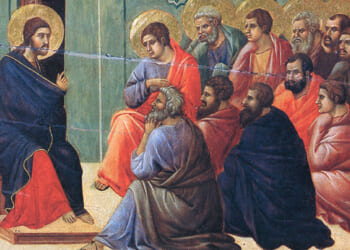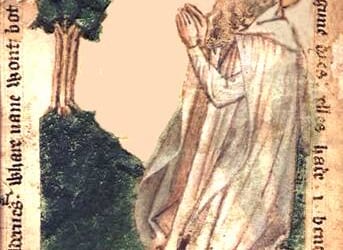Dorothy Day’s work as a lay Catholic, a sometimes radical writer, speaker, and doer who fought against poverty, homelessness, hunger, and disbelief, was subordinate, in her mind, to her role as a mother. In her pilgrimage through life, she hungered for human relationships, and it was particularly through the gift of being a mother that she felt almost complete. It was, after all, what brought her to Roman Catholicism. But ironically, even as she was surrounded by love, by her daughter, grandchildren, and close friends, she grappled with one of the great plagues of our modern world: loneliness.
Dorothy lived in one of the biggest cities on earth, was surrounded by millions, yet felt utterly alone. Loneliness is part of life, Dorothy Day wrote, particularly modern life, but technology and urbanization only exacerbate the human condition of loneliness that is in accord with the will of the Creator. Adam and Eve’s sin resulted in our distance from God. Life is a journey during which humans seek God, hunger for love, and hope to remove the loneliness that is the human lot.
Dorothy Day exacerbated the natural loneliness of life by distancing herself from God when she was a young woman. But the central moment of her existence, that of becoming a mother, allowed her to break through the depths of modern ideologies—Communism, Socialism, Anarchism—in which she was drowning, and surface to the light and air of love, human, motherly love, and love eternal. She wrote about this love in her autobiography, written and published in 1952, The Long Loneliness.
In another of her books, On Pilgrimage, published in 1948, Dorothy Day wrote about the business of life. She lived with her daughter and husband on a West Virginia farm while they awaited the birth of her daughter’s child, Dorothy’s grandchild. She wrote:
Mothers of children, whether of one or a dozen, are intensely preoccupied with creatures: their little ones, food, clothing, shelter, matters that are down to earth and grossly material, such as dirty diapers, dishes, cooking, cramming baby mouths with food, etc.
Anyone who has gone through the years of fatherhood or motherhood raising children and the overwhelming busyness of the days knows that work overwhelms thoughts and feelings, that constant interaction with children and their needs drives away any sensations of loneliness—at least for a time.
Dorothy was always busy, but also always seeking God. She yearned for time to ponder, to pray, to think, to write, to wonder about God’s ways, God’s will. Women in particular, she believed, especially during pregnancy or after the birth of the child, when their bodies are heavy and full, are weighed down by mortality, “like a cross to be carried about.” Daily the tasks, the cares, accumulate, and they never go away. It is a lifelong commitment, parenting, part of God’s plan, and the duties of parenting drive away thoughts of self, concerns for self. The child demands full attention. There is no surrender, no opting out, no choice to move on. It is God’s will, and, Day wrote, “the path of pain is the woman’s lot. It is her glory and her salvation. She must accept.”
Acceptance of God’s will, she believed, involves in part acceptance of loneliness, distance from God, for the work of life, the work of childrearing, the work of marriage, means time spent away from God with others, children, relations, spouse. Life, separation from God, is necessarily lonely, she believed.
During her life she was drawn, often unwillingly, to this source of love. Love demands so much sacrifice, so many challenges, giving of oneself, the threat of it coming to an end, the constant danger of love lost. To these challenges Dorothy surrendered her will and self in giving birth to her daughter. The immense love for this gift from God drove away the fear for a time, forcing it to stand back as she enjoyed loving the child. But love comes with the price of knowing it can end at any time.
Dorothy countered anguish of possible separation and loss by giving into God, baptizing the child—giving the child to God—followed by her own baptism and confirmation—giving herself to God. Countering the anxiety incumbent upon motherhood, she sought God daily in Mass, prayer, and in her reading of Scripture.
Dorothy discovered that motherhood is more than drudgery, housework, cooking, wiping bottoms and tears. “A woman can achieve the highest spirituality and union with God through her house and children, through doing her work.” Often the hecticness of life denies such feelings, and the day-to-day living seems the furthest from God and His expectations. But it is precisely this work of parenting that is the highest calling of the lay Catholic. The mother can be blinded by this calling, can ignore it and push it away, but that only brings darkness and despair.
Still, Dorothy did so much more, becoming a mother to more than just her biological child. Her books and articles in The Catholic Worker reveal a person of tremendous energy constantly at work for others, for laboring people, for farmers, for the unemployed, for the homeless, for the uneducated. She was a person that fought the forces of modernization threatening to destroy the community and the familial base of the community. She agreed with her colleague Peter Maurin that the modern industrial world has destroyed the foundations for family and communities found in the traditional organic life of the farmer. She worked tirelessly to purchase land to open farm communes where families could experience the traditional community life of the farm. Believing that traditional societies were based on hospitality, Dorothy and Peter and the other people involved with The Catholic Worker founded houses of hospitality all over America where people could enjoy the warmth of human friendship in their search for a meal, shelter, and companionship. Dorothy spent much of her time traveling to different houses of hospitality throughout the country to ensure that they were well maintained and conforming to the ideals of The Catholic Worker.
And yet, with all of this activity, with all of the relationships she formed, a modern community and family, she still felt incomplete. She read many books about religion and life. She looked to the saints of the past, especially female saints and the Virgin Mary, to feel inspired in her work. She mingled with leaders of the Church as well as the most downtrodden lay person. She spent her life asking questions and seeking answers. There was something missing.
Dorothy Day was an honest person. She could have decorated her life in bows and ribbons in her autobiography and titled it something cheery and happy. But instead, she called her life The Long Loneliness. Over the course of her life, she knew what was missing, that something that cannot be fulfilled by marriage, work, career, education, or motherhood . . . although being a mother was the closest she could get to the solution for loneliness. Only when she had her final breath, when the life force left her, did she feel complete, at one, merged with love, and the long loneliness came to an end.
Photo by Marcelo Silva on Unsplash
Quotes from Dorothy Day, On Pilgrimage














